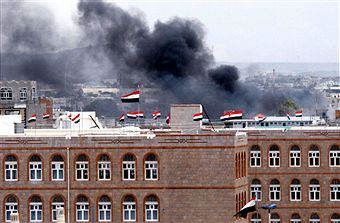 Sometimes you wait and wait for an event, and nothing ever happens. Pakistan is always said to be teetering on
the brink of collapse but never quite edges over the precipice. The same used to be the case with Yemen. In fact, Coffee House predicted that Yemen would implode last year, but Yemeni President Ali Abdullah Saleh managed to hold the country together in the
face of terrorism, irredentist movements, insurgency and, recently, pro-democracy protesters demanding his resignation.
Sometimes you wait and wait for an event, and nothing ever happens. Pakistan is always said to be teetering on
the brink of collapse but never quite edges over the precipice. The same used to be the case with Yemen. In fact, Coffee House predicted that Yemen would implode last year, but Yemeni President Ali Abdullah Saleh managed to hold the country together in the
face of terrorism, irredentist movements, insurgency and, recently, pro-democracy protesters demanding his resignation.
Now, however, the wily leader may finally have run out of road. Heavy clashes have erupted in the capital Sanaa, a day after Saleh again refused to sign a Gulf-brokered power-transition. The clashes have pitted government forces against armed tribesmen loyal to Yemeni opposition leader Sadiq al-Ahmer. Earlier pro-Saleh demonstrators trapped the US, British and European Union ambassadors in an embassy surrounded by gunmen angry about efforts by Arab mediators to ease the president out of power. In the latest development, Saleh has ordered the arrest of al-Ahmar and his nine brothers in a move that will lead to more violence. The U.S. State Department has ordered non-essential U.S. diplomats to depart Yemen and Britain is expected to follow suit.
All this places the UK in a bit of a bind. Yemen, unlike Libya before Colonel Gaddafi’s attack of Benghazi, is a real strategic priority for Britain because of the presence of al-Qaeda. That is why the UK has been spending millions in development and security assistance – to little avail, it seems. Now the immediate challenge will be to stop the fighting before it escalates beyond anyone’s control. The key will be to get Saudi Arabia to finally talk tough with Saleh and get him to understand that he needs to leave office now, not string the process out. The time for an orderly, strung-out process has passed.






Comments